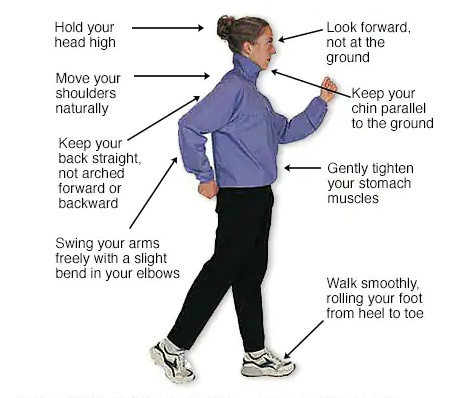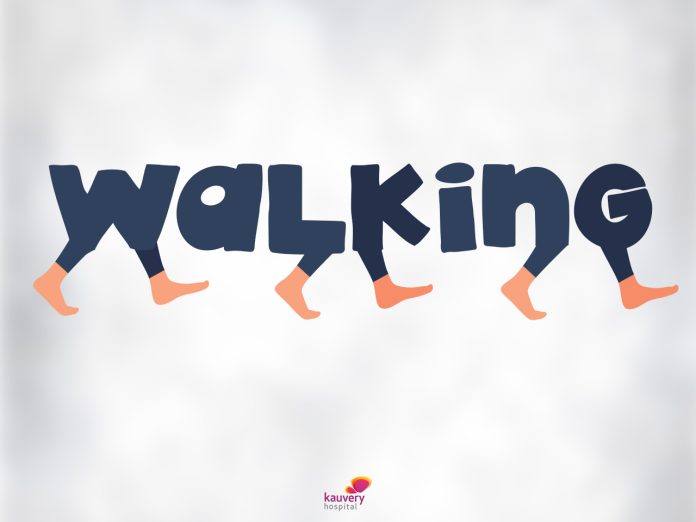Compared to other forms of exercises, walking can be fun.
And when you factor in the scientific benefits of walking, you should hit the road immediately you conclude reading this article!
A study published in Nature found that walking briskly for as little as 10 minutes a day may lower your biological age by 16 years and help you live up to 20 years longer.
According to the World Health Organization, the amount of exercise recommended for adults per week is at least 150 to 300 minutes of moderate-intensity aerobic physical activity or at least 75 to 150 minutes of vigorous-intensity aerobic physical activity.
“Everyone should do daily activity and exercise for at least 30 to 40 continuous minutes” to improve both physical and mental health, experts say.
They note that walking can be one of the best ways to achieve this daily exercise, and that it doesn’t require any special equipment, can be done indoors or outdoors, and can be performed alone or in a group.
It’s also easy to change the intensity of your exercise simply by changing where or how fast you walk. Unlike other forms of exercise, it’s possible to combine walking with other activities, such as running errands or participating in a work meeting by phone, Yahoo Life reports.
Although most people have heard that they should walk 10,000 steps a day, many experts don’t think it’s necessary to walk that much. “Aiming for at least 7,000 to 8,000 steps a day” can help meet the WHO’s guidelines for physical activity.
However, other studies show that some health benefits start to accrue with as few as 4,000 steps or 10 minutes of walking.

Health advantages of walking
It may reduce the risk of dementia. A study published in JAMA Neurology found that taking 9,800 steps may be “optimal” to lower the risk of developing dementia. However, the study found that taking as few as 3,800 steps per day may lower the risk of dementia by 25%.
Walking may help you live longer. A study published in JAMA Internal Medicine found that older women taking about 4,400 steps per day had a 41% lower risk of dying. Another study, this one published in JAMA Network Open, found that taking 7,000 steps a day was linked to a 50% to 70% lower risk of mortality.
It can reduce your risk of heart disease and cancer. A study published in JAMA Internal Medicine showed that taking up to 10,000 steps a day may lower the risk of cardiovascular disease and cancer and that there was no clear benefit to taking more than 10,000 steps.
It may help with high blood pressure. According to a study published in PeerJ, walking 300 minutes a week reduces high blood pressure.
Walking may help you sleep better. A study published in the Sleep Health Journal showed that taking an additional 2,000 steps a day can improve the duration and quality of sleep.
It can improve your mental health. Walking can reduce anxiety and depression, relieve stress and lessen negative emotions, according to a study in the International Journal of Environmental Research and Public Health.
It can help strengthen your bones. Taking a brisk walk for at least 30 minutes a day as little as three days a week can help improve bone density and prevent osteoporosis, according to a study published in PLoS One.
Walking can help lower type 2 diabetes risk. A study published by the American Diabetes Association found that the risk of developing type 2 diabetes went down with every additional 2,000 steps taken.
Taken together, studies show that there is no magical number of steps that everyone should aim for. The benefits of walking are additive, so the more you walk, the more benefits you’ll experience.
Experts advise that, while any form of walking is beneficial, walking briskly and consistently, as well as choosing varied terrains and considering the duration and frequency can optimize the health benefits you receive.
How to get the most out of walking
Walk for at least 30 to 40 minutes without interruption
Walk briskly enough to raise your heart rate and breathing rate. “If you want to raise your level of exertion, then you can walk for longer durations of time or you can specifically walk uphill or over rougher terrain. You can also carry a weighted pack to add to the level of your exertion if you wish,” experts say.
While it may be ideal to take a long, intense walk every day, that’s not feasible for everyone. If you have to choose, take shorter daily walks over longer, more intense walks a few times a week. The regularity is more important than the intensity or duration.
Just get out and do what you can and enjoy it!


